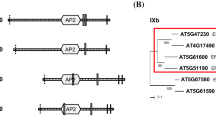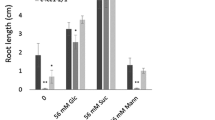Abstract
A cDNA clone corresponding to a novel low-temperature-induced Arabidopsis thaliana gene, named lti140, was employed for studies of the environmental signals and the signal pathways involved in cold-induced gene expression. The single-copy lti140 gene encodes a 140 kDa cold acclimation-related polypeptide. The lti140 mRNA accumulates rapidly in both leaves and roots when plants are subject to low temperature or water stress or are treated with the plant hormone abscisic acid (ABA), but not by heat-shock treatment. The low-temperature induction of lti140 is not mediated by ABA, as shown by normal induction of the lti140 mRNA in both ABA-deficient and ABA-insensitive mutants and after treatment with the ABA biosynthesis inhibitor fluridone. The effects of low temperature and exogenously added ABA are not cumulative suggesting that these two pathways converge. The induction by ABA is abolished in the ABA-insensitive mutant abi-1 indicating that the abi-1 mutation defines a component in the ABA response pathway. Accumulation of the lti140 mRNA in plants exposed to water stress was somewhat reduced by treatment with fluridone and in the ABA-insensitive mutant abi-1 suggesting that the water stress induction of lti140 could be partly mediated by ABA. It is concluded that three separate but converging signal pathways regulate the expression of the lti140 gene.
Similar content being viewed by others
References
Ausubel FM, Brent R, Kingston RE, Moore DD, Seideman JG, Smith JA, Struhl K: Current Protocols in Molecular Biology, pp. 6.8.1–6.8.5. Greene Publishing Associates/Wiley Interscience, New York (1987).
Baker J, Steele C, Dure LIII: Sequence and characterization of 6 Lea proteins and their genes from cotton. Plant Mol Biol 11: 227–291 (1988).
Bray E, Beachy R: Regulation by ABA of β-conglycinin expression in cultured developing soybeen cotyledons. Plant Physiol 79: 746–750 (1985).
Bray E: Drought- and ABA-induced changes in polypeptide and mRNA accumulation in tomato leaves. Plant Physiol 88: 1210–1214 (1988).
Cammue BDA, Broekaert WF, Kellens JTC, Raikhel NV, Peumans WJ: Stress induced accumulation of wheat germ agglutinin and abscisic acid in roots of wheat seedlings. Plant Physiol 91: 1432–1435 (1989).
Cattivelli L, Bartels D: Cold-induced mRNAs accumulate with different kinetics in barley coleoptiles. Planta 178: 184–188 (1989).
Chen THH, Gusta LV: Abscisic acid-induced freezing resistance in cultured plant cells. Plant Physiol 73: 71–75 (1983).
Chen HH, Li PH, Brenner ML: Involvement of abscisic acid in potato cold acclimation. Plant Physiol 71: 362–365 (1983).
Close TJ, Kortt AA, Chandler PM: A cDNA-based comparison of dehydration-induced proteins (dehydrins) in barley and corn. Plant Mol Biol 13: 95–108 (1989).
Cloutier Y, Siminovitch D: Correlation between cold- and drought-induced frost hardness in winter wheat and rye varieties. Plant Physiol 69: 256–258 (1982).
Daie J, Campbell WF: Response of tomato plants to stressful temperatures. Plant Physiol 67: 26–69 (1981).
Dellaporta SL, Wood J, Hicks JB: A plant DNA mini-preparation: version II. Plant Mol Biol Rep 1: 19–21 (1983).
DureIII L, Crouch M, Harada J, Ho THD, Mundy J, Quatrano R, Thomas T, Sung ZR: Common amino acid sequence domains among the LEA proteins of higher plants. Plant Mol Biol 12: 475–486 (1989).
Gilmour SJ, Hajela RK, Thomashow MF: Cold acclimation in Arabidopsis thaliana. Plant Physiol 87: 745–750 (1988).
Gomez J, Sanchez-Martinez D, Stiefel V, Rigau J, Puigdomenech P, Pages M: A gene induced by the plant hormone abscisic acid in response to water stress encodes a glycine-rich protein. Nature 324: 262–264 (1988).
Guy CL, Niemi KJ, Brambl R: Altered gene expression during cold acclimation of spinach. Proc Natl Acad Sci USA 82: 3673–3677 (1985).
Guy CL, Haskell D: Induction of freezing tolerance in spinach is associated with the synthesis of cold acclimation induced proteins. Plant Physiol 84: 872–878 (1987).
Hahn M, Walbot V: Effects of cold-treatment on protein synthesis and mRNA levels in rice leaves. Plant Physiol 91: 930–938 (1989).
Heino P, Sandman G, Lång V, Nordin K, Palva ET: Abscisic acid deficiency prevents development of freezing tolerance in Arabidopsis thaliana (L.) Heynh. Theor Appl Genet 79: 801–806 (1990).
Koornneef M, Jorna ML, Brinkhorst-van der Swan DLC, Karssen CM: The isolation of abscisic acid (ABA) deficient mutants by selection of induced revertants in non-germinating gibberillin sensitive lines of Arabidopsis thaliana (L.) Heynh. Theor Appl Genet 61: 385–393 (1982).
Koornneef M, Reuling G, Karssen CM: The isolation and characterization of abscisic acid-insensitive mutants of Arabidopsis thaliana. Physiol Plant 61: 377–383 (1984).
Koornneef M, Hanhart CJ, Hilhorst HWM, Karssen CM: In-vivo inhibition of seed development and reserve protein accumulation in recombinants of abscisic acid biosynthesis and responsiveness mutants in Arabidopsis thaliana. Plant Physiol 90: 463–469 (1989).
Kurkela S, Frank M, Heino P, Lång V, Palva ET: Cold induced gene expression in Arabidopsis thaliana L. Plant Cell Rep 7: 495–498 (1988).
Laemmli UK: Cleavage of structural proteins during the assembly of the head of bacteriophage T4. Nature 227: 680–685 (1970).
Levitt J: Response of plants to environmental stresses, vol 1, 2nd ed Academic Press, New York (1980).
Logeman J, Schell J, Willmitzer L: Improved method for the isolation of RNA from plant tissues. Anal Biochem 163: 16–20 (1987).
Lång V, Heino P, Palva ET: Low temperature acclimation and treatment with exogenous abscisic acid induce common polypeptides in Arabidopsis thaliana (L.) Heynh. Theor Appl Genet 77: 729–734 (1989).
Maniatis T, Fritsch EF, Sambrook J: Molecular Cloning: A Laboratory Manual. Cold Spring Harbor Laboratory Press, Cold Spring Harbor, NY (1982).
Messing J, Vieira J: A new pair of M13 vectors for selecting either DNA strand of double-digested restriction fragments. Gene 19: 269–276 (1982).
Meza-Basso L, Alberdi M, Raynal M, Ferrero-Cadinanos ML, Delseny M: Changes in protein synthesis in rapeseed (Brassica napus) seedlings during low temperature treatment. Plant Physiol 82: 733–738 (1986).
Mohapatra SS, Poole RJ, Dhindsa RS: Changes in protein patterns and translatable messenger RNA populations during cold acclimation of alfalfa. Plant Physiol 84: 1172–1176 (1987).
Mohapatra SS, Wolfraim L, Poole RJ, Dhindsa RS: Molecular cloning and relationship to freezing tolerance of cold-acclimation-specific genes of alfalfa. Plant Physiol 89: 375–380 (1989).
Mundy J, Chua NH: Abscisic acid and water-stress induce the expression of a novel rice gene. EMBO J 7: 2279–2286 (1988).
Murashige T, Skoog F: A revised medium for rapid growth and bioassays with tobacco tissue cultures. Physiol Plant 15: 473–497 (1962).
Perras M, Sarhan F: Synthesis of freezing tolerance proteins in leaves, crown and roots during cold acclimation of wheat. Plant Physiol 89: 577–585 (1989).
Sakai A, Larcher W: Frost Survival of Plants. Responses and Adaptation to Freezing Stress. Springer-Verlag, Berlin/Heidelberg/New York (1987).
Sanger F, Nicklen S, Coulsen AR: DNA sequencing with chain terminating inhibitors. Proc Natl Acad Sci USA 74: 5463–5467 (1977).
Terry DH, Krizek DT, Mirecki RM: Genotypic variation in coleus in the ability to accumulate abscisic acid in response to water deficit. Physiol Plant 72: 441–449 (1988).
Tseng M-J, Li PH: Alterations of gene expression in potato (Solanum commersonii) during cold acclimation. Physiol Plant 78: 538–547 (1990).
Verwoerd TC, Dekker BMM, Hoekema A: A small scale procedure for the rapid isolation of plant RNAs. Nucl Acids Res 17: 2362 (1989).
Author information
Authors and Affiliations
Rights and permissions
About this article
Cite this article
Nordin, K., Heino, P. & Palva, E.T. Separate signal pathways regulate the expression of a low-temperature-induced gene in Arabidopsis thaliana (L.) Heynh.. Plant Mol Biol 16, 1061–1071 (1991). https://doi.org/10.1007/BF00016077
Received:
Accepted:
Issue Date:
DOI: https://doi.org/10.1007/BF00016077




